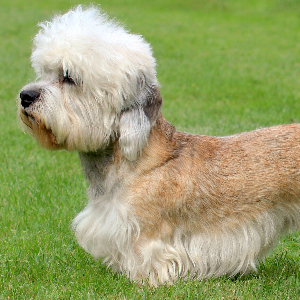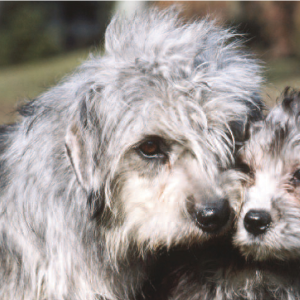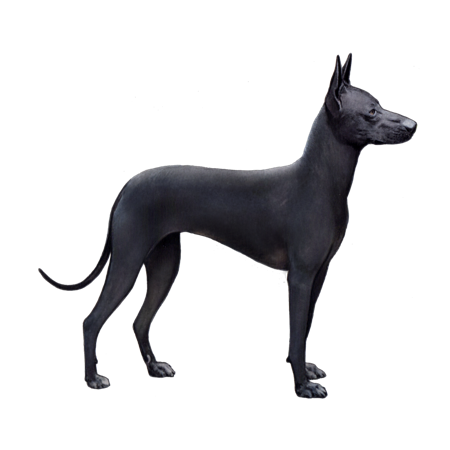
Dandie Dinmont Terrier
The Dandie Dinmont Terrier is a fun-loving and lively breed—and the only one to be named after a fictional character. Though small in size, the dog boasts a big personality. Dandie Dinmonts enjoy the company of kids, making them wonderful family pets.
Interested in discovering if your dog is a Dandie Dinmont Terrier?
Check out Wisdom Panel's DNA tests.

Dandie Dinmont Terrier Traits
General Appearance
A hardy breed, the Dandie Dinmont has short legs and an elongated body.
Coat and Coloring
The Dandie Dinmont dons a coat that comes two colors: "bluish black to silvery gray, and reddish-brown to pale fawn."
Distinctive Physical Traits
Large heads covered, smooth white hair, long pendulous ears, and bright eyes are all signature characteristics of Dandie Dinmonts.
Dandie Dinmont Terrier Temperament
Though the Dandie Dinmont Terrier is a tough little canine, it's usually friendly and suitable for older children. But the breed may be reserved around strangers and might not get along with other dogs.
Dandie Dinmont Terriers are known to be active, independent, intelligent dogs. Because they were bred to hunt, they have a tendency to chase what they consider prey.
As a terrier, the Dandie Dinmont typically has a stubborn, daring personality. But this "gentleman of terriers" is prized for its kind, affectionate character.


Dandie Dinmont Terrier History
Originally from the border regions between Scotland and England, Dandie Dinmonts have been hunting badgers, rabbits, and other vermin since the 1600s.
The breed's personality made it a natural choice for export to the United States. And during the transatlantic passage, the dogs earned their keep by killing rats and entertaining the crew.
This fabulous looking terrier owes its name and popularity to Sir Walter Scott. In his novel Guy Mannering, a character named Dandie Dinmont owns a pack of terriers.
Dandie Dinmont Terrier Care
Nutrition
Dandie Dinmont Terriers need a high-quality dog food formulated for their age. It's also important to monitor the amount of food your Dandie Dinmont eats and reduce the portions if your pup gains weight. Remember that giving too many treats can contribute to obesity.
Grooming
Interestingly, Dandie Dinmont Terriers don't shed. But the long hairs of their coats must be plucked daily, and dead hair should be stripped a few times a year.
Experts also recommend brushing every day to avoid matting. Nails require monthly trimming. And you should check your pup's ears as part of your overall grooming routine.
Exercise
Though built for farm life, the Dandie Dinmont Terrier also thrives in the city—provided it gets enough exercise.
Taking two relatively long walks each day is ideal—but keep in mind Dandie Dinmonts aren't built for a running or jogging pace. Ball-chasing is also a healthy activity as long as the area is securely fenced.
This breed enjoys dog sports such as agility, earthdog trials, flyball, hiking, retrieving, tracking, frisbee, musical freestyle, and competitive obedience.
Training
Training the Dandie Dinmont Terrier requires patience. But the breed responds well to reward-based training using yummy treats or favorite toys as motivation.
A dog with a lot of get-up-and-go, the Dandie Dinmont is cooperative and eager to please. But it's a typical terrier at heart: stubborn, independent, and a little too self-confident. Considering this, you must train your Dandie Dinmont diligently to ensure they are well-mannered.

Dandie Dinmont Terrier Genetic Health Conditions
-
Chondrodystrophy (CDDY) and Intervertebral Disc Disease (IVDD) Risk
Chondrodystrophy (CDDY) is a skeletal disorder characterized by shortened limbs and abnormal early degeneration of the spinal discs, or intervertebral disc disease (IVDD), which predisposes to disc herniation.
Knowing if your Dandie Dinmont Terrier is a carrier or at-risk for these conditions can help you and your veterinarian plan for your pup’s lifelong care. With Wisdom Panel™ Premium, you can get results for over 200 genetic health tests.
Breed Group
Terrier
The Terrier Group ancestors were bred to hunt and kill vermin. They are often characterized as feisty and energetic dogs whose sizes range from fairly small to much larger.
Resources
https://www.akc.org/dog-breeds/dandie-dinmont-terrier/
https://www.google.com/books/edition/Dandie_Dinmont_Terrier/2NwKBgAAQBAJ
Reviewed July 26, 2020 by Cindy Elston, DVM, MPH





















































